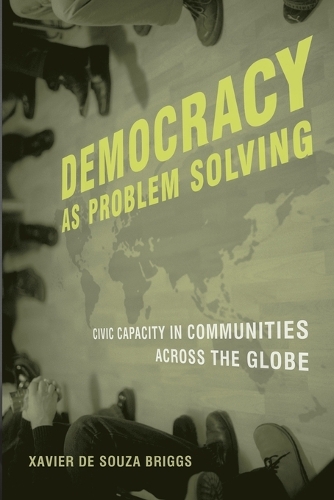
Democracy as Problem Solving: Civic Capacity in Communities Across the Globe
(Paperback)
Publishing Details
Democracy as Problem Solving: Civic Capacity in Communities Across the Globe
By (Author) Xavier de Souza Briggs
MIT Press Ltd
MIT Press
18th July 2008
United States
Classifications
Tertiary Education
Non Fiction
321.8
Winner of Finalist, 2008 C. Wright Mills Award given by the Society for the Study of Social Problems. 2008
Physical Properties
Paperback
388
Width 152mm, Height 229mm, Spine 19mm
522g
Description
Case studies from around the world and theoretical discussion show how the capacity to act collectively on local problems can be developed, strengthening democracy while changing social and economic outcomes.Complexity, division, mistrust, and "process paralysis" can thwart leaders and others when they tackle local challenges. In Democracy as Problem Solving, Xavier de Souza Briggs shows how civic capacity-the capacity to create and sustain smart collective action-can be developed and used. In an era of sharp debate over the conditions under which democracy can develop while broadening participation and building community, Briggs argues that understanding and building civic capacity is crucial for strengthening governance and changing the state of the world in the process. More than managing a contest among interest groups or spurring deliberation to reframe issues, democracy can be what the public most desires- a recipe for significant progress on important problems. Briggs examines efforts in six cities, in the United States, Brazil, India, and South Africa, that face the millennial challenges of rapid urban growth, economic restructuring, and investing in the next generation. These challenges demand the engagement of government, business, and nongovernmental sectors. And the keys to progress include the ability to combine learning and bargaining continuously, forge multiple forms of accountability, and find ways to leverage the capacity of the grassroots and what Briggs terms the "grasstops," regardless of who initiates change or who participates over time. Civic capacity, Briggs shows, can-and must-be developed even in places that lack traditions of cooperative civic action.
Reviews
"If John Dewey, the seminal twentieth-century theorist of democracy as the praxis of community problem-solving, returned to commission case studies about how democracy might work in the twenty-first century, he would be pleased with this important new book. Ranging from growth management in Bombay and Salt Lake City to economic restructuring in Pittsburgh and Sao Paulo to investing in youth in Cape Town and San Francisco, Xavier de Souza Briggs extracts lessons of importance to urban policy makers and civic activists everywhere."--Robert D. Putnam, Malkin Professor of Public Policy, Harvard University, and author of Bowling Alone "Our theories of democracy lag behind the deep changes in how it works, or fails, globally. Expectations have risen, creating huge potentials and challenges. These new rules about what is democratically legitimate are often more demanding than the physical or economic issues. Briggs charts global transformations and identifies dramatic success in unexpected quarters, from Salt Lake City to Mumbai and Cape Town. Social capital and democracy take on new meaning here as Briggs shows how they are subtly intertwined with political cultures and policy innovation."--Terry Nichols Clark, Professor of Sociology, University of Chicago -- Terry Nichols Clark
Author Bio
Xavier de Souza Briggs is Associate Professor of Sociology and Urban Planning at MIT. He has worked as a community planner and senior urban policy official. A faculty research fellow of Harvard's Hauser Center for Nonprofit Organizations, he is also the founder of The Community Problem-Solving Project @ MIT. His book The Geography of Opportunity- Race and Housing Choice in Metropolitan America received a Paul Davidoff Award from the Association of Collegiate Schools of Planning.
